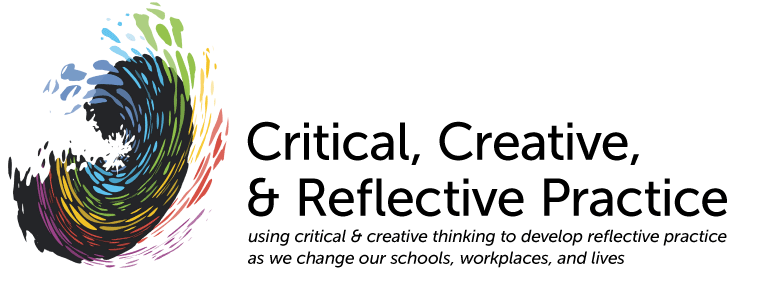Collaborative explorations: Moderate-size open online collaborative learning
(hangout URL for people from a distance =
https://plus.google.com/hangouts/_/g5vcw67epgrouyialtpscqaz6ea?hl=en)
this page can be accessed via the shortlink http://bit.ly/CIT15May
0
Welcome
Read abstract:
Collaborative Explorations (CEs) are an extension of Project-Based Learning in which participants shape their own directions of inquiry stimulated by interactions in a small group. This session conveys the process we have developed over the last year in online CEs with live sessions for an hour over 4 weeks and asynchronous exchanges and inquiry in between.
|
Show bullet form of rest of session description:
MOOCs (massive open online courses)
get masses of people registered knowing that a tiny fraction will complete it
|
Online CEs "moderate-size open online collaborative learning"
establish effective learning in small online communities then potentially scaling up from there
aim to address the needs of online learners who want to:
• dig deeper, make “thicker” connections with other learners
• connect topics with their own interests
• participate for shorter periods than most MOOCs
• learn without needing credits or badges for completion.
|
Show
http://collabex.wikispaces.com and list of previous online CEs
Process for today = take you through many of the processes used in Collaborative Explorations, imagining that you have joined an online CE on the TOPIC: establishing effective learning in small online communities.
(The topic was chosen because it is relevant to online CEs and to many online courses. During this "mini-CE," we’ll also tell you more about the history of CEs.)
Recap Distinctions: Collaborative Explorations in general versus 4-week online Collaborative Explorations versus today's mini-CE face-to-face to convey the process of an online CE
5
“Session 1”
“The main task today is for us to get to know each other in relation to the topic of the Collaborative Exploration, which is establishing effective learning in small online communities
4 minutes freewriting to get present and gather our thoughts about what the topic means to us, about what we hope to get from participation in this CE. (Freewriting, in short, is writing without pausing. If that means you say 'Blah, blah, blah' for a while, that's OK. If you go off topic and remind yourself of the food shopping you need to do, that's OK as well.)"
Everyone freewrites
PT, JS, FS (on hangout) circulate until everyone (including late-comers) is comfortable with what we're doing and why
The main part of today's session is for each of us to take 5 minutes to give our life story--or at least that part of it relevant to why we would join a CE on establishing effective learning in small online communities. The rest of us listen, making notes about ways that we connect with what the other person says and ideas we have to help extend what they are thinking about. If we have time at the end, we'll talk about the connections we notice. I'll go first with the autobiographical introduction to get the ball rolling. I’ll actually take 3 minutes today, not 5. Can someone volunteer to let us know by chat when we have 1 minute left and when time is up?"
PT goes first and, by means of explaining his interest in the topic, also gives background history on CEs.
<After each introduction>"Take a minute to note 'connections and extensions'=places where your interests or background intersect with the speaker's and suggestions to the speaker for extending their work (via reading, people to talk with, ideas, etc.)" <use sheets of paper, later scanned, or
http://bit.ly/CECandE then posted here afterwards>
compilation =
CandE15May14.pdf
Followed by JS & volunteer
20
Think about what you would like to learn more about or dig deeper into. You are, in the end, left to judge for yourself whether what interests you is meaningful and useful.
Session participants make notes for 5 minutes on what they imagine they’d delve into & chat with PT, FS (on hangout) & JS to get clarity
25
“Session 2”
Turn-taking “dialogue process” to clarify what we are thinking about after delving into the topic for a "week." Put up your hand when you want to get in the queue to talk. JS watches queue.
"Try to highlight questions and ideas that have been opened up; minimize statements or advocacy of positions you already had worked out for yourself."
45
Look ahead to making work-in-progress (W-I-P) presentations in “session 3.” Make notes for 5 minutes & chat with PT, FS (on hangout) & JS to get clarity
50
“Session 3”
FS W-I-P presentation from
https://www.youtube.com/watch?v=RvFxd9p0feY 22:11to 28:50
57
Show:
“Between-session work:
Post additional feedback on presentations (optional).
Digest the feedback on your presentation and produce final report by revising W-I-P presentation
Upload it to somewhere accessible (e.g., google docs or a blogpost) and post a link to the google+ community for the CE.
Begin making reflective posts (optional).
“Session 4” Reflection, using Five-phase format to explore our thinking about
a) how the CE contributed to the topic and
b) to the experiential goal, as well as
c) how to extend what has emerged during the CE.
Session finishes with us gathering and sharing our thoughts as before, but this time we will be reviewing the whole CE”
60
Critical Incident Questionnaire (on printed sheets or via shortlink,
http://bit.ly/CIQ1e)
compilation =
CIQ15May14.pdf
65
Q&A
70 end
Follow up
Collaborative Explorations portal,
http://collabex.wikispaces.com
Taylor, P. J. (2013) "Case Study: Collaborative Explorations," in The Peeragogy Handbook,
http://peeragogy.org/case-study-collaborative-explorations/
